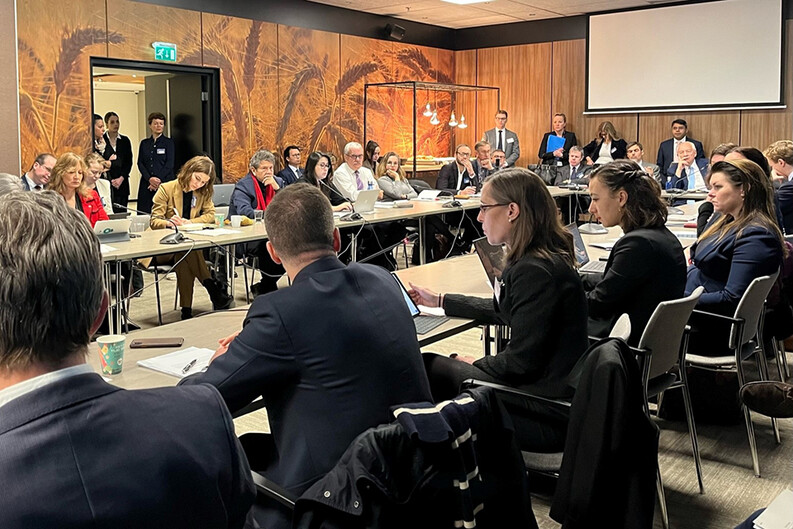Professor Hathaway Speaks at the Hague on ICC’s Jurisdiction

This week, as the Assembly of States Parties — the oversight body of the International Criminal Court (ICC) — convened in the Hague, Professor Oona A. Hathaway ’97 spoke at two panels concerning the jurisdictional reach of the court.
On Dec. 5, Hathaway spoke on a panel titled “Investigating and Prosecuting Cyberwarfare at the ICC,” one of many side events held as part of the assembly. The discussion examined how cyberwarfare falls under the ICC’s jurisdiction per the Rome Statute, the 1998 treaty that established the court and defines its authority.
Russia’s war against Ukraine is the first major conflict to use large-scale cyber operations such as taking down energy and telecom service providers, financial institutions and media outlets. However, there has so far been little discussion about how these crimes can be investigated and prosecuted under international law. The panel’s organizers noted that increased awareness of the court’s ability to prosecute cyberwarfare raises the profile of the ICC to address the regulation of new technologies.
In 2019, 11 states parties to the Rome Statute created a Council of Advisers to explore the specific role of the ICC in the regulation of cyberwarfare. Last year, members of the council presented their final report during the United Nations’ International Law Week in New York. The report found that the Rome Statute allows the ICC to prosecute cyberwarfare without statutory amendment. This week’s panel brought together members of the 2019 council on cyberwarfare and others. In addition to Hathaway, panelists included Lindsay Freeman, Director of Technology, Law, and Policy at the Human Rights Center at UC Berkeley School of Law; a representative of the court’s Office of the Prosecutor; and legal advisers to the Ministry for Foreign Affairs of Luxembourg and Estonia.
The next day, Hathaway participated in a panel titled “The ICC and the Crime of Aggression: In Defense of the Rules-Based International Order,” which considered the jurisdictional reach of the ICC over the crime of aggression. Without a referral by the U.N. Security Council to the ICC, which would certainly be vetoed by the Russian Federation, the court cannot investigate and prosecute Russia’s aggression against Ukraine. As a result, the only way to ensure accountability for the crime of aggression in Ukraine is to create a Special Tribunal to the Crime of Aggression.
In a packed conference room, panelists discussed ways to fill an accountability gap with respect to aggression against Ukraine. The Rome Statue established four core international crimes: genocide, crimes against humanity, war crimes, and the crime of aggression. Unlike the other three crimes, the crime of aggression is limited to states that are party to the Rome Statute. Because Russia is not party to the Statute, its citizens cannot currently be held responsible for the crime before the court. The panel therefore recommended a two-track approach: first, creating a Special Tribunal to prosecute leaders responsible for aggression against Ukraine and, second, amending the Rome Statute to provide jurisdiction over such crimes in the future.
Hathaway was joined on the Dec. 6 panel by H.E Christian Wenaweser, Permanent Representative of Liechtenstein to the U.N., Jennifer Trahan of New York University, and legal advisers to Luxembourg and Estonia.
Both panels were organized by the Permanent Mission of the Principality of Liechtenstein to the United Nations.
The 21st the Assembly of States Parties continues through Dec. 10.
Hathaway is the Gerard C. and Bernice Latrobe Smith Professor of International Law at Yale Law School, Professor of International Law and Area Studies at the Yale University MacMillan Center, Professor of the Yale University Department of Political Science, and Director of the Yale Law School Center for Global Legal Challenges. She has been a member of the Advisory Committee on International Law for the Legal Adviser at the United States Department of State since 2005.


